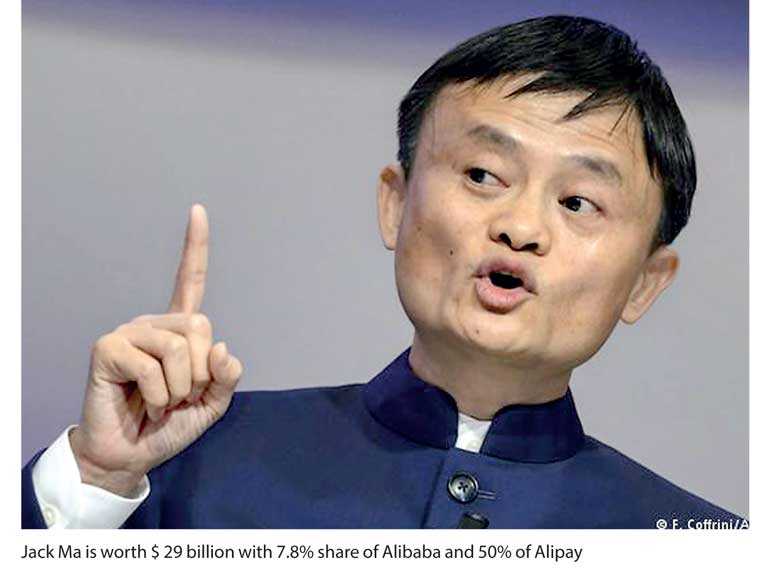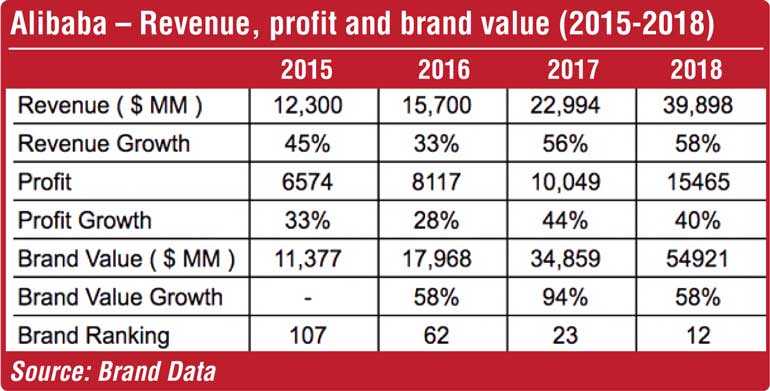Wednesday Feb 18, 2026
Wednesday Feb 18, 2026
Wednesday, 3 October 2018 00:00 - - {{hitsCtrl.values.hits}}


 Recently, I was on route to Sri Lanka from India and was killing time at the Kochin airport when I got my hands on the autobiography of the owner of the world’s top brand, Alibaba.
Recently, I was on route to Sri Lanka from India and was killing time at the Kochin airport when I got my hands on the autobiography of the owner of the world’s top brand, Alibaba.
The founder’s actual name was Ma apparently and he had started business in a small apartment in Hangszou in the backdrop of China wanting to become a member of the World Trade Organization.
Ma had grown up in poor communist China and had failed the final exam twice at secondary school. In 1972, accidentally, Richard Nixon had visited China – the town that Ma lived. Post the visit the town became a tourist site.
Ma, having entrepreneurial blood, embarked on a part-time job of showing tourists the city in exchange for learning English from the visitors. A foreigner gave him the name Jack and hence the name Jack Ma.
Little did this tourist know that that the name he gave would go on to be one of the top-of-the-mind ‘personality brands’ globally in 50 years.
Ma - $ 29 b
Ma started his life as a school teacher. Today he is Jack Ma. He is worth $ 29 billion, owning 7.9% of Alibaba, the largest technology company in China which has a product portfolio ranging from e- commerce and cloud computing to entertainment. Jack Ma also owns more than 50% of the company Alipay. He was the first Chinese and the first person globally to launch a $ 150 billion IPO offering to the listed companies in the New York Stock Exchange successfully.
Alibaba
Just three years back, in 2015 the brand was recording a revenue of $ 12.3 billion in top line but today in 2018, the company is touching $ 39 billion whilst as a brand the company that was worth $ 11.3 billion is today crossing $ 54 billion, which means that the brand value is more than the revenue generated in financial year.
Alibaba three years back was registering a bottom line of $ 6.5 billion but today in 2018, it has doubled the profits to $ 15.4 billion which signals to the world the sheer ruthless growth the company has been driven on.
Ma – the teacher
Jack Ma has an amazing philosophy of life that comes from a typical Chinese upbringing I believe. He says: “At 20 years you must learn, in the 30s and 40s you must take risks and by 50 years you are good at what you do. So train and make others take over your business.”
Jack Ma is a man who walks the talk. At the ripe age of 54 he has announced his retirement and announced his successor whilst grooming the candidate to lead the world’s number three brand next year. His latest quote is: “I don’t want to die in the office room,” which is the confidence he is showing on the next challenge.
Apparently Jack Ma wants to devote his time to education. Some now refer to him as ‘Teacher Ma’ at Alibaba, which is the respect that the people of Alibaba have towards their leader.
Jack Ma – by accident
It is said that Jack Ma came into business by accident. He was rejected from over 30 jobs after college, which included KFC. It was at the age of 30 that he realised that he was good at business. He advocates that at the age of 30 a youngster must work for a good boss rather than searching for a top company. The logic being that “you must learn to do things properly. Then, when you become a leader it’s easier to earn respect,” says Jack Ma. An interesting analogy for a youngster of today.
At the recently-concluded World Economic Forum there was a set of youngsters who got an audience with Jack Ma. His advice was: “No matter how smart you are, you will encounter mistakes. You will overcome mistakes over time but what is important is for you to experience the suffering when you make a mistake. That is where the learning happens. That is where you learn how to face life. Learn it.” This is the essence of Jack Ma’s philosophy. I guess this is how he made Alibaba mature enough for him to pass the baton to Daniel Zhang Yong.
2016-2017 Alibaba
Alibaba became the fastest growing retail brand in the world in the year 2016-2017. It beat Amazon and IKEA on brand value, recording a stellar performance of a 94% growth from $ 17.9 billion to $34.8 billion. The source of growth was essentially fuelled by new product categories.
If one does a deep dive on 2016-2017, China retail and wholesale grew by 41% and 28% respectively whilst the International retail and wholesale grew by 35% and 16% respectively. The winner in the portfolio for Alibaba was ‘cloud computing and internet infrastructure’ which grew by a commanding 175% which comes from strategic thinking that Jack Ma brought to the business. I guess when he said that he realised he was good at business, he may have been referring to this talent.
Today – Alibaba
Jack Ma on the strong foundation of ‘Alibaba’ has now expanded to acquire China’s video streaming – Youn Ku, thereby entering into the booming digital marketing and entertainment business. This directional change makes Alibaba move to the dynamic market of youth.
To strategically increase the company penetration geographically, Alibaba has purchased Lazada, which covers Indonesia, Philippines, Malaysia and Singapore – the key markets in South-East Asia that the ASEAN and the Pan Pacific economic agreements cover.
Jack Ma by launching Ali Express gave a window to the SMEs of China to meet the global marketplace; in fact in the key markets of Russia, Spain and Israel, Ali Express is the market leader which tells the world how Ali Express has customised its offering to cater to different cultures.
Jack Ma – Don’t work with governments
At one point, Jack Ma advised the private sector not to work with governments on business opportunities. He did not go into detail but speculation is that Alibaba failed to secure Moneygram as the US Government did not approve of the purchase. I guess this was a wise move that actually worked in favour of Jack Ma given the trade war between the US and China on the 600 billion taxes imposed by the US and China retaliating with the 300 billion counter trade initiative.
Alibaba – Unique pricing
Jack Ma strongly practices the Chinese value system of unique strategies collectively taken to be competitive. Alibaba competed with EBay by removing intermediate costs. The revenue model for Alibaba is from advertising by suppliers and selling key word bidding. Incidentally this method of revenue generation contributes to 60% of the profits that Alibaba earns from the e-commerce site.
As at now Alibaba has a penetration of 0.5 billion people from the total population of around seven billion on earth which is the strength that Jack Ma has brought into the company. Now the company has expanded to Alipay, which is the most popular mobile payment system in China, logistical and infrastructure platform – China Smart Logistics, and the marketing and technology platform for Alibaba on line – AliMama.com that adds to the companies that constitute the value chain.
Jack Ma’s key DNA at Alibaba is ‘Gold standard execution’. I guess without such a stance Alibaba could have not become the third most valued brand in the retail space globally crossing $54 billion dollars as at end 2018 and growing at 58%.
What next at Alibaba
If I go back in time, when Steve Jobs passed away, many thought that the Apple era was over, but today the company has further expanded and consolidated the business with the successor. I guess we will see a repeat of history when it comes to Alibaba. The logic being that we now have in the world young talent that can always take over the mantle of powerful personalities.
Let’s see what Daniel Zhang will do with Alibaba in the years to come. As the popular notion states, “Alibaba was never about Jack Ma, but Jack Ma will forever belong to Alibaba.”
(Dr. Rohantha Athukorala has a double degree in Marketing and is an MBA alumnus of Harvard University Executive Education. The thoughts are strictly his personal views.)